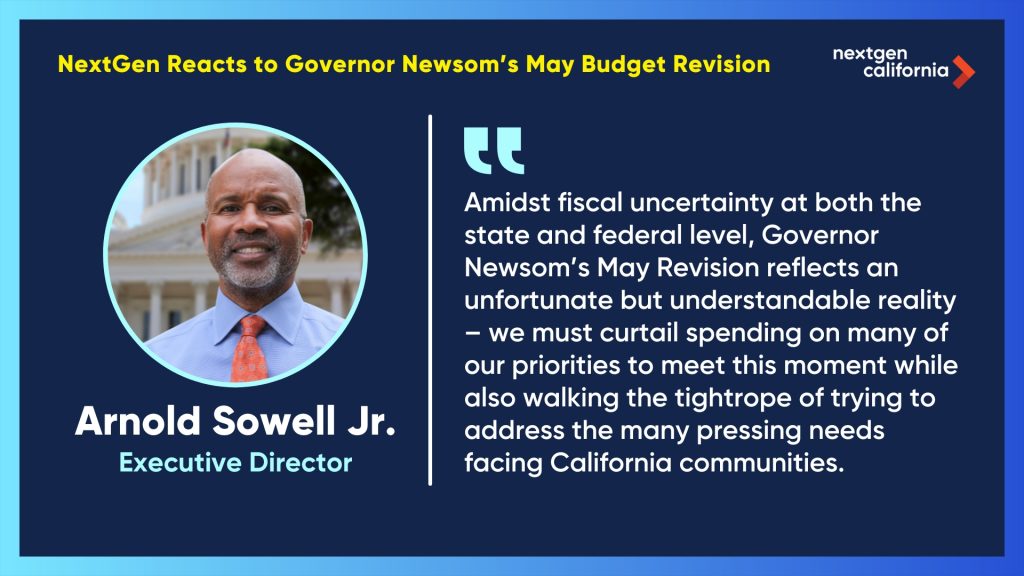NextGen California Responds to the Challenging Fiscal Outlook and Funding Cuts Outlined in Governor Newsom’s May Budget Revision

For Immediate Release: May 19, 2025
Contact: Tyler Bushnell, tyler.bushnell@nextgenpolicy.org
With the state budget deficit projected to reach $12 billion, Governor Newsom’s May Revision proposes deep cuts to key programs to balance the budget.
SACRAMENTO – Last Wednesday, May 14th, Governor Newsom released his revised 2025-26 California State Budget, the so-called May Revision. As detailed by the Governor, the May Revision paints a confounding economic picture: increased state revenues being totally overwhelmed by the fiscal repercussions of the Trump tariffs, resulting in a state budget deficit totaling $12 billion. To close the deficit and balance the budget, the Governor’s May Revision proposes various program cuts and fund shifts. Now begins the serious work and negotiations between the Legislature and the Governor to craft a final budget by the June 15th constitutional deadline.
Our state budget is a value statement and the blueprint that guides California’s fiscal and policy investments into the future. As the 4th largest economy in the world, our state budget totals over $300 billion in general fund and special fund expenditures. Clearly, the current state budget deficit and the proposed program cuts outlined in the Governor’s May Revision will have near term ramifications across a range of issue areas – health, education, the environment, housing, and social services – and affect the lives of millions of Californians. It also appears that the current fiscal uncertainty will remain indefinitely, as our state budget coffers still have not felt the full extent of the new federal Administration’s imposition of funding cuts, policy changes, and tariffs.
NextGen California fights to advance policies and programs that focus on equity and justice for all Californians and, unfortunately, though it attempts to minimize harm, the Governor’s May Revision will hurt many of our state’s most vulnerable populations and communities. Areas where the Governor’s revised state budget makes notable funding changes include access to healthcare, combating climate change, and supporting higher education.
NextGen California’s Executive Director, Arnold Sowell Jr., and other members of the NextGen team share their reactions to the Governor’s May Revision below, as well as their main takeaways for what these budget cuts mean for their legislative priorities and the lives of Californians:
Statement from NextGen California Executive Director, Arnold Sowell Jr.:
“Amidst fiscal uncertainty at both the state and federal level, Governor Newsom’s May Revision reflects an unfortunate but understandable reality – we must curtail spending on many of our priorities to meet this moment while also walking the tightrope of trying to address the many pressing needs facing California communities,” said Arnold Sowell Jr., Executive Director of NextGen California. “The fiscal situation our elected officials are facing is extremely difficult, having to choose between cuts to important programs that protect and support vulnerable populations. Here at NextGen, even in these trying fiscal times, we look forward to working with the Governor’s office, State Legislators, and our trusted partners to ensure that the final budget continues our efforts to build a more equitable, prosperous, and climate resilient California for all.”
Statement from NextGen California Policy Advisor, Jamie Pew:
“Budgets like this one are what happens when Big Oil and the Trump administration are able to inject chaos into California’s economy,” said Jamie Pew, Policy Advisor for NextGen California. “ Until Big Oil is paying in full to clean the air and water it pollutes and the climate disasters it triggers, our state will continue to balance its budget on the backs of hard working Californians. NextGen California supports the Governor’s proposal to reauthorize the Cap-and-Invest program to align with our 2045 carbon neutrality target – and urges strengthening the program further. Policymakers are now presented with an opportunity to refashion the Cap-and-Invest program by pulling back subsidies for corporate polluters and re-investing those funds in all California communities.”
Statement from NextGen California Legislative Director & Policy Advisor, Samantha Seng:
“Amidst a backdrop of financial uncertainty being driven by the ever changing federal landscape, we thank Governor Newsom for attempting to minimize the harm to students pursuing a higher education,” said Samantha Seng, Legislative Director & Policy Advisor for NextGen California. “The budget does help to ensure that critical state financial aid allocations through the Cal Grant program and Middle Class Scholarship continue this year so that no student sees a reduction in their grant amounts. However, more needs to be done to ensure that all California higher education students, regardless of their family situations, have the opportunity to receive critical student services as well as complete their higher education.”
Statement from NextGen California Research & Policy Advisor, Tiffany Germain:
“In what is clearly a very difficult budget year, NextGen California and our partners are deeply grateful to Governor Newsom for his steadfast leadership in fully funding School Meals for All,” said Tiffany Germain, Research & Policy Advisor for NextGen California. “This program is a proven success in fighting hunger and easing financial burdens on California families by providing two free meals a day to every student, regardless of income. To maintain and build on this progress, continued investment in school nutrition is critical, including support for the Kitchen Infrastructure and Training (KIT) program and connecting schools to local farmers through the Farm to School Incubator Grant program. We also look forward to working closely with the Administration to ensure that the next phase of the Healthy School Food Pathway program continues—we see this initiative as vital to enabling school food professionals to deliver fresh, nutritious meals across California.”
###
The mission of NextGen California is to fight for progressive policy change to address environmental, social, racial, gender, and economic inequity in California through justice-centered legislative advocacy, grassroots partnerships, and democratic civic engagement.